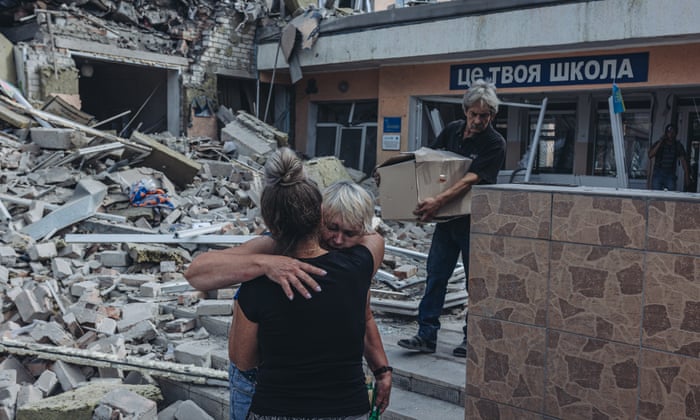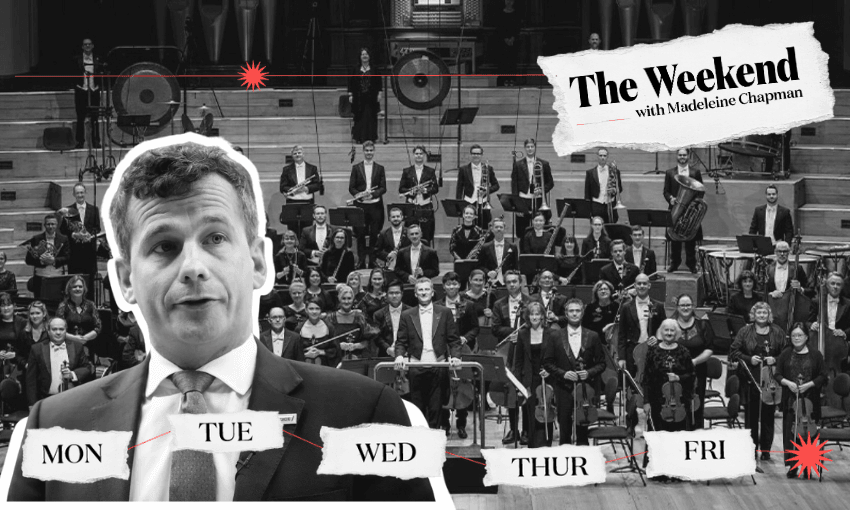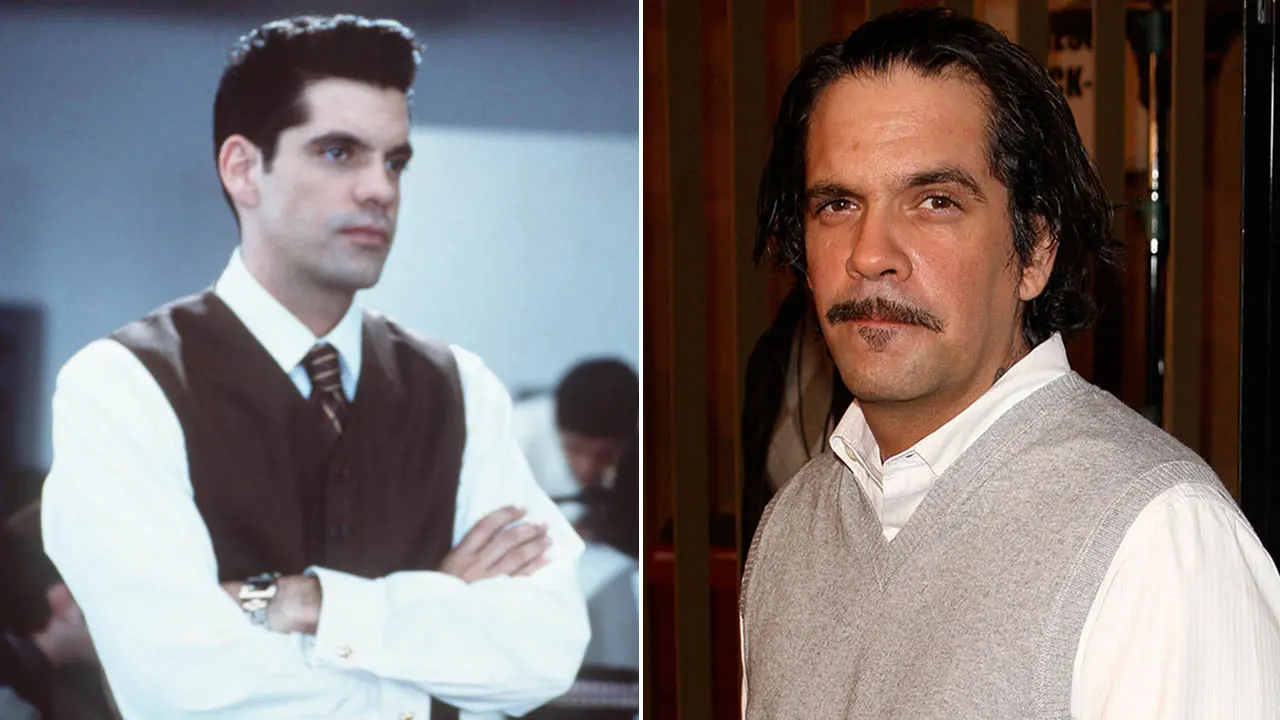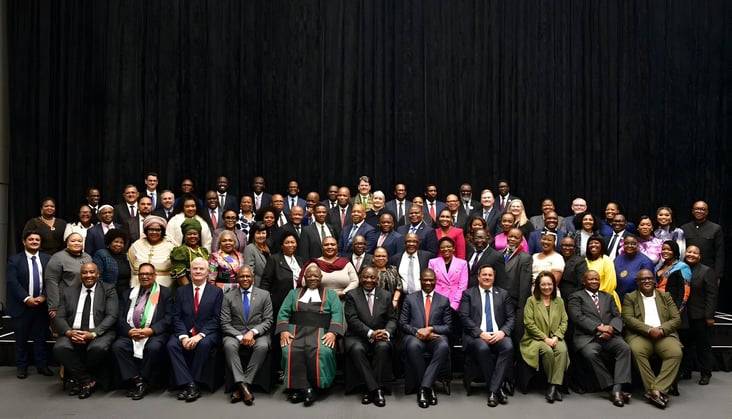Key events
Ukrainian forces have destroyed 50 Russian ammunition depots using US-supplied Himars rocket systems in the war with Russia, Ukrainian defence minister Oleksiy Reznikov said on Monday.
“This cuts their [Russian] logistical chains and takes away their ability to conduct active fighting and cover our armed forces with heavy shelling,” he said in televised comments.
Reuters could not independently verify Reznikov’s remarks about the use of High Mobility Artillery Rocket Systems (Himars).
Summary of the day so far …
- Ukraine warned that grain exports would not restart as hoped after the signing of a landmark deal aimed at easing the food crisis if a Russian airstrike on a key port on Saturday was a sign of things to come. The attack on Odesa, which the Ukrainian president, Volodymyr Zelenskiy, denounced as “barbarism” and a sign that Moscow could not be trusted to implement the freshly inked deal, drew international condemnation. Turkey, which helped broker the accord allowing exports to resume, said immediately after the double cruise missile hits on the strategic southern port that it had received assurances from Moscow that Russian forces were not responsible.
- Contradicting the claim that Russia had not been responsible, Kremlin press secretary Dmitry Peskov has denied that cruise missile strikes on Odesa would have any impact on the export of grain. He told the media: “These strikes are connected exclusively with military infrastructure. They are in no way related to infrastructure that is used for the export of grain. This should not affect – and will not affect – the beginning of shipments.”
- Russian foreign minister Sergei Lavrov has embarked on a four-day tour of several countries in Africa. On his first stop in Egypt he sought to reassure his counterpart Sameh Shoukry that Russian grain supplies would continue and met with the secretary general of the League of Arab States, Ahmed Aboul Gheit, where he spoke of deepening cooperation between Russia and the Arab League. “We are at the beginning of a new era, which would be a movement towards real multilateralism, not the one which the west tries to impose,” Russia’s foreign ministry quoted Lavrov as saying.
- Ukrainian military officials have claimed a “turning point” in the battle to retake the southern region of Kherson, saying they will use western weapons to liberate by September the first major city captured by Russian forces. Sergiy Khlan, an aide to the administrative head of the Kherson region, said in an interview with Ukrainian television on Sunday: “We can say that a turning point has occurred on the battlefield. We are switching from defensive to counteroffensive actions.”
- Ukraine will continue doing all it can to inflict as much damage on Russian forces as possible and will not be cowed, Zelenskiy has vowed. “Even the occupiers admit we will win,” he said in his nightly video address on Sunday. “We do everything to inflict the highest possible damage on the enemy … we will celebrate against all odds. Because Ukrainians won’t be cowed.”
- Russia’s ministry of defence has claimed that it repelled two Ukrainian landing craft attempting to cross the Dnieper River into the occupied southern part of the Kherson region. The ministry also claims to have shot down six unmanned drones, and to have destroyed a depot being used as a transport hub for US-supplied Himars ammunition in the last 24 hours.
- Another school in Mykolaiv was almost completely destroyed overnight, according to the city’s mayor. Oleksandr Syenkevych stated that “the ceilings between the first and second floors were destroyed, classrooms were damaged”. Five people have been wounded, including a teenager, in shelling on the city in the last 24 hours.
- The UK’s Ministry of Defence has said in its daily intelligence breifing that “inconclusive fighting continues in both the Donbas and Kherson sectors. Russian commanders continue to face a dilemma; whether to resource the offensive in the east, or to bolster the defence in the west.”
- One of the Russian-imposed officials in Ukraine’s occupied Zaporizhzhia region has said that a referendum on the region joining the Russian Federation will most likely take place in September, alongside a similar one in occupied Kherson.
- The head of Russia’s investigative committee, Alexander Bastrykin, said Moscow had charged 92 members of Ukrainian armed forces with crimes against humanity and proposed an international tribunal backed by countries including Bolivia, Iran and Syria.
That is it from me, Martin Belam. I will be back tomorrow. Tom Ambrose will be with you shortly.
Another school in Mykolaiv was almost completely destroyed overnight, according to the city’s mayor.
Oleksandr Syenkevych posted to Telegram to say that the city was shelled again in the early hours this morning, and that “a private warehouse and the territory of several private enterprises were hit”.
Providing further details of strikes that took place yesterday evening, the mayor said:
Another school in Mykolaiv was almost completely destroyed – the ceilings between the first and second floors were destroyed, classrooms were damaged.
Windows in a nine-story high-rise buildings were blown out by the shock wave and debris. Two more private houses caught fire from the impact of ammunition and debris. Commercial buildings, cars and a garage were also damaged.
So far, it is known about five wounded, among them a teenager.
The claims have not been independently verified.
In his daily conference call with reporters, the Kremlin’s press secretary, Dmitry Peskov, has denied that cruise missile strikes on Odesa will have any impact on the export of grain.
Reuters quotes him saying: “These strikes are connected exclusively with military infrastructure. They are in no way related to infrastructure that is used for the export of grain. This should not affect – and will not affect – the beginning of shipments.”
At the weekend, Russia struck at the key port city within hours of having signed a deal designed to guarantee the safe passage of grain out of Ukraine.
In its daily operational briefing, Russia’s ministry of defence has claimed that it repelled two Ukrainian landing craft attempting to cross the Dnieper River into the occupied southern part of the Kherson region.
It claimed that the boats and the “saboteurs onboard” were destroyed.
The ministry also claims to have shot down six unmanned drones, and to have destroyed a depot being used as a transport hub for US-supplied Himars ammunition.
None of the claims have been verified.
Maksym Kozytskyi, governor of Lviv, has posted to say that in the last 24 hours, 326 people arrived in the region on two evacuation trains from the east of the country. 851 people departed for Przemyśl in Poland. He said that there was an air alarm yesterday at 8.27am, with the threat of missiles from the Black Sea, but “the danger did not materialise”.
In a separate post, Kozytskyi welcomed reports that Pope Francis wished to visit Kyiv, saying “the visit of the pontiff would be a strong step of support for our people”.
There is a set of photos from the village of Yahidne in Chernihiv region illustrating a new Ukrainian phenomena of young people gathering to clear rubble while also listening to techno DJs.
“Volunteering is my lifestyle now,” said Tania Burianova, an organiser with the Repair Together initiative. “I like electronic music and I used to party. But now it’s wartime and we want to help, and we’re doing it with music.”

Burianova said the clean-up raves bring together those who had lost their nightclub community during the war, helping them regain a sense of normalcy and fun while contributing to the recovery of damaged towns.

One beneficiary, 68-year-old local resident Nina told reporters she was grateful, saying: “They already repaired our windows, doors and entrances. We couldn’t do it ourselves with our salaries or pensions. I’m thankful that they helped us.”

Justin Spike reports for Associated Press that most of the volunteers were in their 20s and 30s and came from Kyiv, about two hours’ drive away. But others have come from the western city of Lviv and also nearby Chernihiv, while some foreign volunteers arrived from Portugal, the US, Germany and elsewhere. The clean-up at the cultural centre was the group’s eighth project so far.
The self-proclaimed Donetsk People’s Republic (DPR) that occupies a part of eastern Ukraine claims that one civilian was killed and two injured by shelling from Ukrainian forces in the last 24 hours.
The DPR, which is recognised as a legitimate authority by only three UN member states, claims that with the aid of troops from Russia and from the similarly self-proclaimed Luhansk People’s Republic, it has “liberated” 255 settlements in total. 14 of these settlements were, it says, attacked by the Ukrainian armed forces.
None of the claims have been independently verified.
Referendum on occupied Zaporizhzhia and Kherson joining Russia likely in September – reports
One of the Russian-imposed officials in Ukraine’s occupied Zaporizhzhia region has told the RIA Novosti news agency that a referendum on the region joining the Russian Federation will most likely take place in September, alongside a similar one in occupied Kherson.
The agency quotes Vladimir Rogov saying: “Everything is moving towards the fact that the referendum will be in the first half of September. I will not name the exact date yet. Election commissions are being formed.”
The RIA report states that “the main work of the election commissions being created will be to clarify the lists of voters, given that some people have left the region”.
It states that Rogov said “it is highly likely that the referendum will be held simultaneously in Zaporizhzhia and Kherson regions, as successes on the line of contact have assured security”.
Oleh Synyehubov, governor of Kharkiv, has posted images today to Telegram that he claims shows the damage in the city of Chuhuiv after an overnight Russian attack. He claims:
The house of culture, where people were hiding in the basement, was actually destroyed by the occupiers. Rescuers have already freed three people from the rubble, but there were still people in the basement. In addition, residential buildings, an educational institution were damaged, and open areas were hit.
The claims have not been independently verified.

Russian investigator says Moscow has charged 92 Ukrainians with war crimes
The head of Russia’s investigative committee said Moscow had charged 92 members of Ukrainian armed forces with crimes against humanity and proposed an international tribunal backed by countries including Bolivia, Iran and Syria.
The government’s Rossiiskaya Gazeta on Monday quoted committee head Alexander Bastrykin as accusing “more than 220 persons, including representatives of the high command of the armed forces of Ukraine, as well as commanders of military units that shelled the civilian population”.
The Ukrainians were involved in “crimes against the peace and security of humanity, which have no statute of limitations”, he said. Bastrykin, whose committee investigates major crimes, said 92 commanders and their subordinates had been charged, and 96 people, including 51 armed forces commanders, declared wanted.
Reuters could not independently verify the committee’s allegations. Ukrainian authorities were not immediately available for comment.
Bastrykin was asked about his committee’s investigations into Ukrainian security forces’ actions in the self-declared people’s republics of Donetsk and Luhansk, separatist, Moscow-backed territories in Ukraine’s east, and whether investigations could take place under UN auspices.
Given that the “collective west” openly backed Ukraine, he said it would be more appropriate to work with Russian partners in the Commonwealth of Independent States, the Collective Security Treaty Organization, the BRICS group and the Shanghai Cooperation Organization.
It was “expedient” to involve countries with an independent position on Ukraine, “in particular, Syria, Iran and Bolivia”, he added.
Bastrykin said 1,300 criminal investigations had been initiated into members of Ukraine’s military, political leadership, radical nationalist associations, and armed formations, with more than 400 people so far held accountable.
The UK’s Ministry of Defence has issued its intelligence briefing on the position in Ukraine. It claims:
Inconclusive fighting continues in both the Donbas and Kherson sectors. Russian commanders continue to face a dilemma; whether to resource the offensive in the east, or to bolster the defence in the west.
Germany is back on course to meet its target of 75% gas storage levels by 1 September, according to Klaus Mueller, who is head of the Bundesnetzagentur gas regulator.
Reuters reports he said that there were decent gas injection levels and gas importer Uniper had ended withdrawals from storage.
Ukraine claims it will recapture Kherson by September
Ukrainian military officials have claimed a “turning point” in the battle to retake the southern region of Kherson, saying they will use western weapons to liberate by September the first major city captured by Russian forces.
Sergiy Khlan, an aide to the administrative head of the Kherson region, said in an interview with Ukrainian television on Sunday: “We can say that a turning point has occurred on the battlefield. We are switching from defensive to counteroffensive actions.”
“We can say that the Kherson region will definitely be liberated by September, and all the occupiers’ plans will fail,” he added.
Helped by deliveries of western-supplied long-range artillery, Ukrainian forces have been clawing back territory in the southern Kherson region in recent weeks, adding to suggestions that its troops are edging closer to a long-promised counteroffensive.
President Volodymyr Zelenskiy endorsed claims of a successful counteroffensive during his national address on Saturday, saying Ukrainian forces were moving “step by step” into the city.
Kherson was occupied by the Russian army on 3 March, the first major Ukrainian city captured by Russian forces since 24 February.
Ukrainian officials believe that Russian troops were able to take the city in part because Ukrainian security service agents failed to blow up the Antonivskyi bridge that crosses the Dnipro river, allowing troops to enter the city.
However, an increase in strikes in recent days against key Russian weapons stores and logistics around the southern city has prompted Ukraine’s military to claim its forces have moved within range of Russian targets.
Russia rallies support in Africa

Jon Henley
Russian foreign minister, Sergei Lavrov, has embarked on a four-day tour of several countries in Africa.
On his first stop in Egypt he sought to reassure his counterpart Sameh Shoukry that Russian grain supplies would continue and met with the secretary-general of the League of Arab States, Ahmed Aboul Gheit, where he spoke of deepening cooperation between Russia and the Arab League.
Lavrov reassured Egypt over Russian grain supplies, amid uncertainty over the future of a deal to resume Ukrainian exports via the Black Sea.
Egypt, one of the world’s top wheat importers, bought 80% of its wheat from Russia and Ukraine last year, and has been torn between ties to Moscow and its close relationship to the west.
“We confirmed the commitment of Russian exporters of cereal products to meet their orders in full,” Lavrov said in Cairo after talks with his Egyptian counterpart, Sameh Shoukry. “We discussed … cooperation in this area, agreed on further contacts, and have a common understanding of the causes of the grain crisis.”
Lavrov’s tour, which will also take in Uganda, Ethiopia and Congo, is aimed essentially at rallying African nations to Russia’s side. In an article published in four African papers, he rejected accusations that Russia was responsible for the food crisis.
He hailed what he called “an independent path” taken by African countries in refusing to join western sanctions against Russia and the “undisguised attempts of the US and their European satellites to gain the upper hand and impose a unipolar world order”.
Late on Sunday night Lavrov flew to the Republic of the Congo.
Moscow speaks of ‘new era’ with Arab League
Russia’s foreign minister, Sergei Lavrov, met with the permanent representatives of the member countries of the Arab League, promising officials the beginning of a “new era”.
“We are at the beginning of a new era, which would be a movement towards real multilateralism, not the one which the west tries to impose,” Russia’s foreign ministry quoted Lavrov as saying.
Ukraine warns Russian airstrikes will stall grain deal

Jon Henley
Ukraine earlier warned that grain exports would not restart as hoped after the signing of a landmark deal aimed at easing the food crisis if a Russian airstrike on a key port on Saturday was a sign of things to come.
The attack on Odesa, which the Ukrainian president, Volodymyr Zelenskiy, denounced as “barbarism” and as a sign that Moscow could not be trusted to implement the freshly inked deal, drew international condemnation.
Turkey, which helped broker the accord allowing exports to resume, said immediately after the double cruise missile hits on the strategic southern port that it had received assurances from Moscow that Russian forces were not responsible.
But Russia’s defence ministry said on Sunday the strikes had destroyed a naval vessel and arms delivered by Washington. Kyiv said two Kalibr missiles fired from Russian warships hit an area around a pumping station and that two more were shot down.
The strike, which Ukrainian armed forces said did not hit the port’s grain storage area or cause significant damage, cast grave doubts on the future of the deal, which allows Ukrainian grain ships to navigate safe corridors that avoid known mines in the Black Sea and was hailed on Friday as a diplomatic breakthrough.
Kyiv said preparations to restore grain shipments to their prewar levels of 5m tonnes a month were continuing, but Zelenskiy’s economic adviser, Oleg Ustenko, warned on Sunday that the airstrike “indicates it will definitely not work like that”.
Ustenko told Ukrainian television that Ukraine had the capacity to export 60m tonnes of grain over the next nine months, but it would take up to 24 months if its ports could not function properly.
Summary and welcome
Hello and welcome back to the Guardian’s live coverage of the war in Ukraine.
I’m Samantha Lock and I will be bringing you all the latest developments for the next short while.
It is 8am in Kyiv and here is where things stand:
- Ukraine predicts that it will recapture the southern region of Kherson by September. Sergiy Khlan, an aide to the head of Kherson region, said in an interview with Ukrainian television: “We can say that the Kherson region will definitely be liberated by September, and all the occupiers’ plans will fail.” President Volodymyr Zelenskiy also said Ukrainian forces were moving “step by step” into Kherson. However, other reports suggest Ukrainian soldiers are doing well just to hold the frontline in nearby villages.
- Ukraine has warned that a deal to export grain via the Black Sea will stall if there are further Russian airstrikes on key ports. Zelenskiy’s economic adviser, Oleh Ustenko, told Ukrainian television: “Yesterday’s strike indicates that it will definitely not work like that.” The caution comes after Saturday’s missile attack in Odesa where Moscow insisted it only hit a Ukrainian warship and US-supplied Harpoon anti-ship missiles.
- The Russian foreign minister, Sergei Lavrov, has embarked on a tour of several countries in Africa. On his first stop in Egypt he sought to reassure his counterpart Sameh Shoukry that Russian grain supplies would continue, and met with the secretary general of the League of Arab States, Ahmed Aboul Gheit, where he spoke of deepening cooperation between Russia and the Arab League. Late on Sunday night he flew to the Democratic Republic of the Congo.
- Ukraine will continue doing all it can to inflict as much damage on Russian forces as possible and will not be cowed, Volodymyr Zelenskiy has vowed. “Even the occupiers admit we will win,” he said in his nightly video address on Sunday. “We do everything to inflict the highest possible damage on the enemy … we will celebrate against all odds. Because Ukrainians won’t be cowed.”
- The German president, Frank-Walter Steinmeier, has said Russia’s war against Ukraine is also a “war against the unity of Europe”. “We must not let ourselves be divided, we must not let the great work of a united Europe that we have begun so promisingly be destroyed,” he said in a speech in the western German city of Paderborn. “This war is not just about the territory of Ukraine, it is about the double shared foundation of our values and our order of peace.”
- Nearly half a million Ukrainian children are going to school in the European Union, according to the European Commission’s department of migration and home affairs. A total of 492,647 Ukrainian children had been integrated into the national school systems of the European Union, the department said.
- Ukraine’s health ministry has said that least 18 medical personnel have been killed and nearly 900 medical facilities damaged or destroyed by Russia’s invasion of Ukraine. The ministry said more than 50 medical workers had been wounded by Russian attacks and 123 medical facilities in Ukraine were totally destroyed by the invasion, while another 746 needed repairs.
- A Canadian citizen has died in Ukraine, Canada’s foreign ministry confirmed. Media reports suggested the Canadian was with two US citizens who recently died in the Donbas region of eastern Ukraine. The US and Canadian governments have not given details on how recent the deaths were, or their circumstances.














.jpg)






Discussion about this post